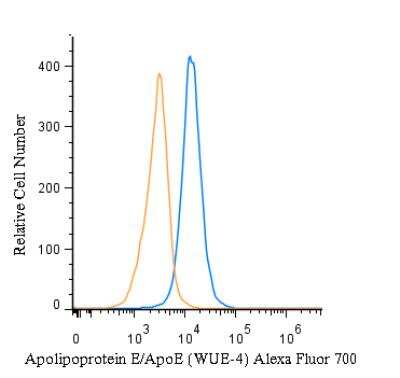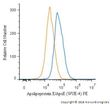Apolipoprotein E (APOE) Mouse Monoclonal Antibody [Clone ID: WUE-4]
Frequently bought together (3)
beta Actin Mouse Monoclonal Antibody, Clone OTI1, Loading Control
USD 200.00
Other products for "Apolipoprotein E"
Specifications
| Product Data | |
| Clone Name | WUE-4 |
| Applications | CyTOF-ready, ELISA, FC, ICC/IF, IHC, IP, WB |
| Recommended Dilution | Flow (Intracellular), Immunohistochemistry-Paraffin, Flow Cytometry: 1 ug per million cells, ELISA: 1:100-1:2000, Immunohistochemistry: 1:50-1:200, Immunoprecipitation: 1:10-1:500, Western Blot: 2 ug/ml, Immunocytochemistry/ Immunofluorescence: 1:200, CyTOF-ready |
| Reactivities | Human, Mouse (Does not react with: Rat) |
| Host | Mouse |
| Isotype | IgG1, kappa |
| Clonality | Monoclonal |
| Immunogen | Purified human ApoE [UniProt# P02649] |
| Formulation | PBS containing 0.05% BSA, 0.05% Sodium Azide. Store at 4C short term. Aliquot and store at -20C long term. Avoid freeze-thaw cycles. |
| Concentration | lot specific |
| Purification | Protein G purified |
| Conjugation | Unconjugated |
| Storage | Store at -20°C as received. |
| Stability | Stable for 12 months from date of receipt. |
| Predicted Protein Size | 36 kDa |
| Gene Name | apolipoprotein E |
| Database Link | |
| Background | ApoE (apolipoprotein E) is the protein constituent of cholesterol/triglyceride-rich plasma lipoproteins, and is a multifunctional glycosylated secretary protein found almost in all organs with high activity in hepatic tissues. ApoE expression is induced by cholesterol-rich diets and is enhanced in lipoproteins in humans with genetic disorder type III hyperlipoproteinemia (HLP) characterized by remnant lipoproteins accumulation in plasma and premature atherosclerosis. ApoE circulates in blood as a protein component of VLDLs, chylomicron remnants, a subclass of HDL etc, and in cerebrospinal fluid as well as CNS interstitial fluid on small particles and disks resembling HDLs. ApoE facilitates transport of cholesterol and other lipids, as well as the clearance of plasma lipoproteins by serving as a critical ligand for lipoprotein uptake by LDL receptors and related proteins. ApoE participates in lipids redistribution to cells (e.g. CNS) that require cholesterol and phospholipids for reparative processes. ApoE also involves in proliferation inhibition of smooth muscle cells/lymphocytes, antigen presentation, and cholesterol efflux stimulation from foam cell macrophages. Defects in APOE have been linked to HLPP3 (hyperlipoproteinemia type 3), AD2 (Alzheimer disease type 2), SBHD (sea-blue histiocyte disease), LPG (lipoprotein glomerulopathy), and certain autoimmune disorders including multiple sclerosis and psoriasis. |
| Synonyms | AD2; APO-E; LDLCQ5; LPG |
| Note | This ApoE antibody is useful for Western blot, ELISA, Immunohistochemistry and Immunoprecipitation. In Western blot a band is observed at ~36 kDa, representing the ApoE protein. |
| Reference Data | |
| Protein Families | Adult stem cells, Druggable Genome, Secreted Protein, Stem cell - Pluripotency |
| Protein Pathways | Alzheimer's disease |
Documents
| Product Manuals |
| FAQs |
| SDS |
{0} Product Review(s)
0 Product Review(s)
Submit review
Be the first one to submit a review
Product Citations
*Delivery time may vary from web posted schedule. Occasional delays may occur due to unforeseen
complexities in the preparation of your product. International customers may expect an additional 1-2 weeks
in shipping.






























































































































































































































































 Germany
Germany
 Japan
Japan
 United Kingdom
United Kingdom
 China
China


![Flow Cytometry: Apolipoprotein E/ApoE Antibody (WUE-4) TA336538 - An intracellular stain was performed on SK-MEL-28 cells with Apolipoprotein E/ApoE Antibody [WUE-4] TA336538F (blue) and a matched isotype control (orange). Cells were fixed with 4% PFA and then permeabilized with 0.1% saponin. Cells were incubated in an antibody dilution of 10 ug/mL for 30 minutes at room temperature. Both antibodies were conjugated to FITC.](https://cdn.origene.com/assets/images/antibody/primary-antibody/108/ta336538-18-c.jpg?d=110x110)



![Flow Cytometry: Apolipoprotein E/ApoE Antibody (WUE-4) TA336538 - An intracellular stain was performed on SK-MEL-28 cells with alpha-Synuclein [2A7] Antibody TA336538AF488 (blue) and a matched isotype control (orange). Cells were fixed with 4% PFA and then permeabilized with 0.1% saponin. Cells were incubated in an antibody dilution of 5 ug/mL for 30 minutes at room temperature. Both antibodies were conjugated to Alexa Fluor 488.](https://cdn.origene.com/assets/images/antibody/primary-antibody/108/ta336538-17-c.jpg?d=110x110)
![Flow Cytometry: Apolipoprotein E/ApoE Antibody (WUE-4) TA336538 - An intracellular stain was performed on SK-MEL-28 cells with Apolipoprotein E/ApoE [WUE-4] Antibody TA336538PE (blue) and a matched isotype control (orange). Cells were fixed with 4% PFA and then permeablized with 0.1% saponin. Cells were incubated in an antibody dilution of 2.5 ug/mL for 30 minutes at room temperature. Both antibodies were conjugated to Phycoerythrin.](https://cdn.origene.com/assets/images/antibody/primary-antibody/108/ta336538-19-c.jpg?d=110x110)
![Flow Cytometry: Apolipoprotein E/ApoE Antibody (WUE-4) TA336538 - An intracellular stain was performed on HepG2 cells with Apolipoprotein E/ApoE Antibody TA336538 [WUE-4] (blue) and a matched isotype control (orange). Cells were fixed with 4% PFA and then permeabilized with 0.1% saponin. Cells were incubated in an antibody dilution of 1.0 ug/mL for 30 minutes at room temperature, followed by Mouse IgG (H+L) Cross-Adsorbed Secondary Antibody, Dylight 488.](https://cdn.origene.com/assets/images/antibody/primary-antibody/108/ta336538-16-c.jpg?d=110x110)



